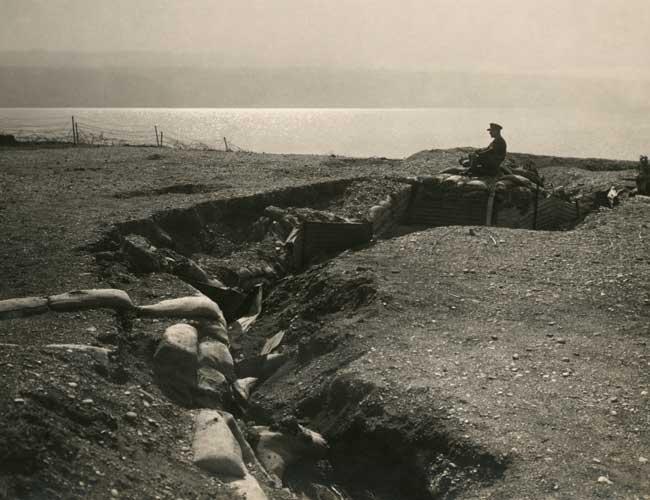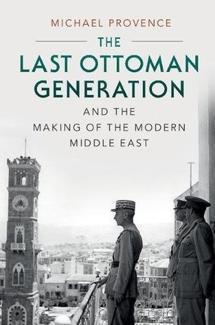
‘The Last Ottoman Generation and the Making of the Modern Middle East’ by Michael Provence (Cambridge University Press, 314 pages, $30)
The centenary of the First World War has prompted renewed focus on the conflict’s historical importance. Tomes have been written on the war’s effect in Europe and there has also been a welcome emphasis on its cataclysmic impact on the Middle East. The conflict precipitated a crumbling of the regional order that was perhaps more sweeping and chaotic than anywhere else.
In Europe the bloody crucible of the First World War ushered in the modern age and precipitated the downfall of old regimes (the Habsburg, Hohenzollern, and Russian monarchies all disappeared, replaced by various republican regimes). The Ottoman monarchy also collapsed, bringing the axe down on a political order that had prevailed for centuries across swathes of the Middle East.
But these fractures are not the whole story. “The Last Ottoman Generation” by Michael Provence is a stimulating semi-revisionist history focusing on continuities rather than ruptures. “For a hundred years, historians have interpreted the history of the 20th century in the Middle East as the birth of this or that nation, the emergence of this or that state, the rise of this or that idea,” writes Provence. “By contrast, this is the story of the end of plans, hope, prospects and horizons, and how people survived and made sense of the events that had overtaken them.” The book focuses on “the death of something old and evolving, and asks how did the old things, patterns, habits, cultures, ways of thinking, and possibilities affect what came after.”

This is perhaps not as groundbreaking as it may appear, at least in Turkish historiography. For years historians have examined continuities between the Ottoman and republican eras, pushing against the idea that the Republic of Turkey represented a radical break with all that had gone before. While formally the republican reforms broke new ground, they often built on deep late Ottoman roots. As Provence writes, “by late 1922 the Ottoman state was gone, but its living citizens, officers, bureaucrats, buildings, schools, roads, memories, habits, culture, archives, and offices remained.”
Provence focuses on Arab elites introduced into the empire’s institutions in its final decades. Crucial to this introduction was the system of modern military education, which Provence argues shaped Ottoman elites in ways that affected the region long after the empire collapsed. “Thousands of young men and women entered modern Ottoman state schools determined to succeed within a state and system they pledged to protect and preserve,” he writes. The book provides colorful biographies of various characters who went through this education system. “The story of their times, lives, and struggles properly begins not with the Turkish or Arab nationalism they may have eventually espoused, but with the experiences they shared as self-identified protectors and servants of a doomed empire.”
He was not a military man, but Leon Effendi Baos of Basra is an exemplary case cited in the book. Born in southern Iraq, Baos was the Greek Orthodox son of an Ottoman telegraph official. Under the Ottoman capitulations his father had been considered Greek, but during the Greek-Ottoman war over Crete in 1897 he had been required to formally take an oath of Ottoman citizenship to keep his state employment. In 1919 Baos found himself in the entirely new state of Iraq. He wanted Greek citizenship but could not get it. He then wanted his old Ottoman citizenship, but as that was not possible he wanted to take Turkish citizenship. Ultimately he was forced against his will by the League of Nations High Commissioner to become an Arab citizen of mandate Iraq.
The years after the collapse of the empire were shocking to many who had been nurtured to serve it. The book describes in detail the shift from the Ottoman system to a “mandate” system under the League of Nations, in which hegemony over the old Ottoman Arab lands was bitterly contested by France and Britain, who were charged with “guiding” their mandates to eventual independence. A thin layer of “civilization” rhetoric covered a more squalid war of wills. Both Britain and France carried out atrocities, testing state of the art weapons on defenseless locals to secure control over historic and energy-rich lands.
The halfway house of mandates was arguably worse than outright colonialism. Local independence advocates were denied the moral clarity of a direct oppressor to campaign against, while the authorities had an excuse for neglect and not investing in proper institution building. “As mandate citizens proclaimed repeatedly, Ottoman rule had delivered an imperfect but superior semblance of rights, justice and representation to the majority of the population,” writes Provence. “Petitioners viewed the Ottoman state as more legitimate and representative than the colonial regimes that replaced it.”
But the book is probably too sanguine about Ottoman rule. In offering a justified indictment of the mandate system, Provence at times suggests it was mandate rule alone that laid the ground for post-independence authoritarian. Extrajudicial detention, torture, assassinations, collective punishment, execution of critics, overmighty militaries, powerless legislatures and inauthoritative judiciaries were “tendencies built into the structure of the colonial state, with its odd boundaries and pervasive security anxieties, and were inherited directly by the post-colonial state,” he writes. This underestimates an earlier system of late Ottoman injustice that also affected generations to come.
The book excavates remarkable details from the years of flux after the collapse of the Ottoman state. The Anatolian resistance movement led by Mustafa Kemal Atatürk drew considerable interest in Syria, where people saw it as a continuation of Ottoman resistance against Western imperialism. “Events in Anatolia were widely known and greeted rapturously in Damascus, Jerusalem and many other places,” writes Provence. “The atmosphere of ferment and excitement was inescapable. The press declared Mustafa Kemal ‘a new savior of Islam’ and a ‘Hero of the Ottoman East.’” Many anticipated Ottoman armies of liberation and began to agitate for renewed union with Ottoman state. “Rapturous celebrations in Aleppo, Beirut, Damascus, Jerusalem and Baghdad greeted the victory in western Anatolia. Shops were festooned with banners and flags and the newspapers were full of glowing reports.”
Other details complicate the contemporary Ottomanist line popular among some in today’s Turkey: Provence refers to the many post-Ottoman Arabs who still felt affinity to the Committee of Union and Progress (Young Turks), with Iraqi Prime Minister Yasin al-Hashimi often comparing British injustice to the “oppressions of Abdülhamid II.” Ironically, Abdülhamid is lionized in contemporary Turkey by conservatives who imagine him as the embodiment of the Ottoman imperial spirit.
Nostalgia for empire is clearly a mixed bag. As “The Last Ottoman Generation” shows, history is always too sophisticated to fit into narrow ideological confines.
* Follow the Turkey Book Talk podcast via iTunes here, Stitcher here, Podbean here, or Facebook here, or Twitter here.